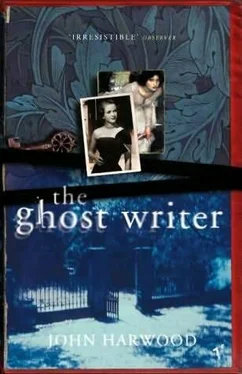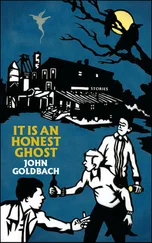
John Harwood
The Ghost Writer
© 2004
I FIRST SAW THE PHOTOGRAPH ON A HOT JANUARY AFTERnoon in my mothers bedroom. She was asleep-so I thought-in the sunroom at the other end of the house. I crept in through the half-open door, enjoying the feeling of trespass, breathing the scents of perfume and powder and lipstick and other adult smells, mothballs for the silverfish and insect spray for the mosquitoes our screens never quite managed to keep out. The net curtains were drawn, the blind half lowered; there was nothing to see through the window except the blank brick wall of old Mrs Noonan's place next door.
I stole across to my mothers dressing-table and stood listening in the dim light. The house was silent apart from the muffled ticking and creaking which my father insisted was the iron roof expanding in the heat, not someone creeping about in the dark cavity above the ceiling. One by one I tried the drawers, three on each side. As always, only the bottom left-hand drawer was locked. There were wooden panels between each layer, so you couldn't see what was in the drawer below by pulling out the one above. Last time I had searched through the litter of tubes and jars and bottles crammed into the uppermost drawer on the right. Today I started on the next one down, rummaging through a shoebox crammed with packets of needles and carded buttons, reels of coloured cotton and hanks of wool, the loose ends hopelessly tangled.
To see if there was anything behind the shoebox, I tugged at the drawer. It stuck, then shot right out of the dressing-table and hit the floor with a thud. I tried to force the drawer back in, but it wouldn't go. Any second now, I expected to hear my mother's footsteps hurrying up the hall, but no sound followed. Even the ticking in the ceiling had died away.
There seemed no reason why it wouldn't fit. Except that something cold and hard was stuck to the underside, right at the back. A small brass key. I had prised it loose, peeled away the tape and opened the locked drawer before the enormity of what I was doing had begun to register.
The first thing I saw was a book, whose title would elude me for years afterward. The Carillon? The Chemillon? The Chalmion? A word I didn't know. The grey paper cover was crumbling at the edges and pitted with rust-coloured spots. It had no pictures and looked grown-up and boring.
I couldn't find anything else. Then I saw that the brown paper lining on the bottom of the drawer was actually a very large envelope. It had a typewritten address and stamps on it, and one end had been slit with a knife. Another disappointment: just a thick bundle of pages with typewriting on them, tied together with rusty black ribbon. As I drew out the bundle, a photograph slid into my lap.
I had never seen the woman in the photograph before, and yet I felt I knew her. She was young, and beautiful, and unlike most people I had seen in photographs she did not look straight at you, but gazed away to one side, her chin tilted slightly upwards, as if she did not realise anyone was looking at her. And she did not smile, at least not at first. As I went on staring at her I began to think I could see the faintest trace of a smile, just at the corner of her mouth. Her neck was amazingly long and slender, and though the picture was in black and white, I felt I could see the changing colours of her skin where the light fell across the back of her neck and touched her forehead. Her hair, masses and masses of it, was drawn back behind her head and wound up in a long plait, and her gown-as I felt sure a dress as wonderful as hers must be called-was made of a soft dark velvety material, with shoulders gathered like the wings of angels.
Boys, I had learned from somewhere, were supposed to think their mothers were beautiful, but I suspected mine was not. She looked older and thinner than most of the mothers at my school, and worried about everything, especially me. Lately she had been very worried indeed. There were dark pouches under her eyes; the lines across her forehead and around her mouth seemed to be cutting deeper into the skin, and her hair, which used to be dark brown, had grey streaks running through it. I worried that I had worn her out by not being good enough; I was always meaning to be better, yet here I was burgling her secret drawer. But I also knew that the anxious, haunted look could descend when I had done absolutely nothing wrong. Whereas the woman in the photograph was calm and beautiful and alive, more alive than anyone I had ever seen in a picture.
I was still kneeling in front of the drawer, lost in the photograph, when I heard a hissing sound from the doorway. My mother stood rigid, fists clenched, nostrils flared. Tufts of hair stuck out from her head; the whites of her eyes seemed to be spilling out of their sockets. For a long, petrified instant she didn't move. Then she sprang, hitting and hitting and hitting me, screaming in time to the blows that fell wherever she could reach until I broke away and fled wailing down the hall.
FROM OLD MRS NOONAN I LEARNED THAT IF YOU SHIVERED for no reason it meant that someone was walking over your grave. Mrs Noonan was thin and stooped and had twisted papery hands with strange bulges around the knuckles; she smelt of stale lavender and felt the cold even in summer, especially when she took her first sip of tea. My mother didn't like her saying it, so Mrs Noonan took to shivering silently when she was drinking tea in our kitchen, but I knew what she meant. When I wasn't being bad, I used to imagine that someone had found out my mothers grave, a man in dark clothes with a dead white face who dodged behind a tombstone whenever he saw you coming, so that you could never catch him doing it. That was why her anxious look came down for no reason at all. Some days you could tell that he was tramping back and forth, back and forth, over and over her grave.
We would sometimes drive past Mawson cemetery, but I'd never been inside because we had no relatives there to visit. My father's parents were buried in Sydney, and he had a married sister in New Zealand who wrote every Christmas, but they never came to see us. All my mother's relatives were buried in England, and that was where I imagined her grave must be.
Mawson is an overgrown country town sprawled along the edge of the Great Southern Ocean. It used to be called Leichhardt, after some luckless explorer who never returned from the dead heart, until, so my father explained, the council decided to change it to something more cheerful. Beyond the remnants of the old town centre there's nothing much to see except shopping malls and filling stations and mile after mile of sprawling identical suburbs. Beaches to the south, hills to the north; the dead heart beyond. That was where you ended up if you crossed the narrow strip of farmland beyond the hills and kept driving north through the endless sandy scrub and saltpan into the desert. In summer when the north wind blew, clouds of fine red dust covered the town. Even inside, you could feel the grittiness of it between your teeth.
My mothers stories of growing up in the English countryside were full of things we didn't have in Mawson, chaffinches and mayflies and foxgloves and hawthorn, coopers and farriers and old Mr Bartholomew who delivered fresh milk and eggs to their house with his horse and cart. When she wasn't away at boarding-school, she lived with her grandmother Viola, and a cook and a maid, in a house called Staplefield which had staircases and attics and more rooms than you could count, and she had a best friend called Rosalind who was allowed to come and stay for the summer holidays. My mother could describe their favourite walks so vividly you felt you were there, provided you didn't interrupt. There was one I especially liked to hear about, which led across fields full of friendly cows to something called a wicket gate, up through an oak forest, where if you moved very quietly you might easily see a hare or a badger, and out into a clearing, where they would find-somehow it came as a complete surprise every time-a pavilion, which my mother once drew for me. It was like a smaller version of the bandstand in our Memorial Park, but freshly painted, cream and blue and dark green, with cushions for the polished wooden seats. No one ever disturbed them, so they would stay for hours, talking or reading or looking out over the countryside below, so far they could almost see the ships anchored away to the south in Portsmouth harbour.
Читать дальше













